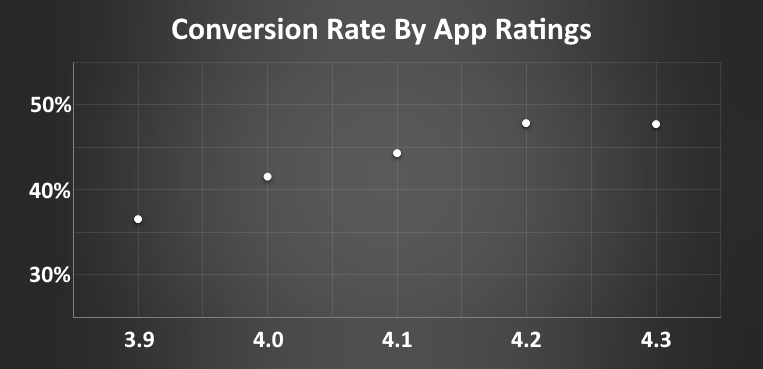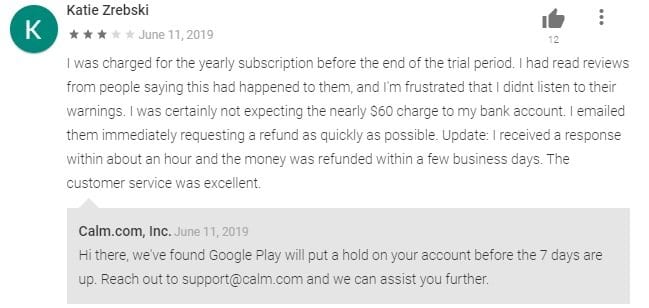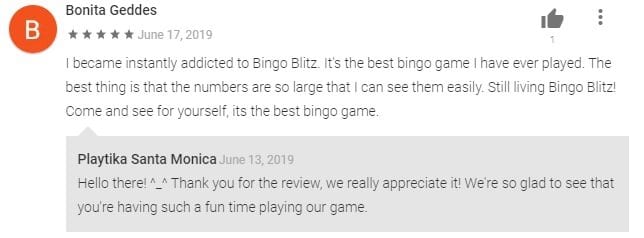
Mobile app store reviews and ratings in different app stores are great assets when it comes to the algorithms that prioritize your app’s ranking and discoverability. In today’s competitive marketplace, apps need to stand out amongst the competition. If there’s an app similar to yours with higher ratings or better app reviews, potential users are likely to download the one with more stars. As mentioned in our app store optimization guide, over 50% of all users check your app’s rating before deciding on whether they’ll install your app or not. Because of this, we’ve decided to cover both iOS app ratings and Android app ratings in this article, filling you in on everything you need to know about how the app stores use ratings and reviews to rank and position apps.
What are ‘in-app ratings and reviews’?
To be clear, this article will not be about app store review guidelines or app store review times. These are strictly related to the app review team and the app review process that apps go through after being submitted and launched in the store. Apps are rejected and denied access on the platform if the app developers do not respect the terms and conditions of the app stores. Let’s get back to what app ratings and app reviews are! App reviews are messages that your userbase can add on your app’s store page. They can ask questions, express how their user experience was, or simply say “thank you” for the awesome app you made. 
Do app reviews affect conversion rates?
App reviews are the most credible way for current users to express their first impressions of your app. When thousands of people love your app and show it, even more, people will be convinced to install it. Of course, this also works the other way around. Getting flooded with negative reviews could kill your conversion rate, resulting in new users ignoring your app or present users deleting it out of fear or anger. Sometimes, reviews can be related to something outside of the app. We’ll talk about that in the negative reviews section of this article. People tend to ignore apps with little to no reviews, considering them a waste of time. 
- App ranking
- App store downloads
- Number of visits to the app page
Should you buy app store reviews & ratings?
This is one of the questions we get asked most often. If app store reviews and ratings impact your business so much, why not buy them in bulk and increase everything? In theory, it sounds good, in practice, not so much. Buying app store reviews is blackhat ASO – you are trying to break the rules and play the system in order to improve your chances of succeeding. Similar to blackhat SEO, you face big risks. Not only will you risk getting penalized if you’re caught, but you also risk getting banned from the app store. We recommend that you get app reviews the right way! You won’t have any problems if you encourage users to review your app. You can also give them extra features, gifts or in-game loot in exchange for a review. Nothing bad will happen if you do that. As long as you don’t give any financial compensation for the review!
Increase your app store ranking by managing your app’s reviews and ratings!
As we’ve previously mentioned, working on improving your app store reviews and rating will also boost your app store ranking. There’s a direct correlation between app reviews, discoverability, and downloads, which means better app reviews can eventually help to increase your app downloads. According to TechCrunch, Apple uses Chomp, a leading app search engine, that uses customer feedback to influence discoverability. In fact, Apple goes as far as to “reward” high rated apps and “penalize” apps with lower rankings. Their unique algorithm ranks apps according to high ratings and positive reviews, helping the good ones stay on top. This also acts as an incentive for developers to rethink their strategies and work on updates to fix their glitches. The same works for the Google Play store and other related app stores worldwide. Some experts also suggest that the algorithms check the reviews for certain keywords, and rank your app accordingly.
Dealing with negative app reviews
The best way to deal with negative app reviews is to reply quickly and turn negative reviews into user feedback. There are tens of ASO tools that you can use to keep track of your app’s reviews. Don’t disregard your user’s opinions. Even if they are angry, make sure to answer and try to solve their complaints. Maybe they encountered a bug, lost something in the app (money, data or features) or simply don’t understand how something works. By replying to the users, you have a greater chance of transforming that 1-star into a 5-star. You are also increasing the chances of new users being more lenient with your app. They won’t be so quick to judge an app when they see that the app developer is hard at work on improving the app and trying to solve the issues that users face. 
Increasing positive app reviews
Increasing the number of positive app reviews will help your app grow. People will be more likely to trust your app, and the app stores will position your application higher. Great apps have thousands of genuine positive reviews. The easiest way to get reviews is to kindly ask for them. It’s that simple. If your user base is happy, they will gladly help you out with a 5-star rating and a short review. You can ask your users for reviews by using an in-app push notification. Tinker with your notification timing and your copy. Change the title or the way you address your user base. Eventually, you’ll find the most effective way to ask for reviews. Make sure to time your requests. Do not ask for a review just after the user has installed your app. People won’t review a product without using it first.
Give incentives!
A strategy that works wonders in mobile games is to give your user base a gift in return for their review. Whether it’s in-game currency or levels, make sure that you reward your users for helping you grow. Try not to ask for 5-star reviews! Let them decide on their own.
Start Contests!
Similar to the way Facebook pages increase like counts by creating “like and share” contests, you can do the same with app reviews. Ask users on social media or forums to review your app and give a prize to a random winner.
Always say thank you!
A user has no obligation to rate or review your app. They only do this on their own accord. Saying “thank you” for their help is a great way to maintain a great relationship with your users and increase the likelihood of keeping them for a longer period of time.
Improve Your Product
This may sound obvious, but consistently getting bad reviews can be an important wake-up call for app publishers, and not only because of their impact on app rankings and downloads. The information included in relevant reviews can be invaluable and give you a unique insight into why users abandon your app when they do. Use this information to refine your overall product strategy from all aspects. For example, if users are giving your app negative reviews that mention the lack of a feature, or tendency to crash on specific devices, then you should seriously consider bumping those up on your list of priorities for development and QA.
Guide users on integrating certain keywords in the reviews
Having your main keywords in user’s reviews can improve your app’s ranking. See the example above. The keyword “bingo game” is one of the app store keywords used by people to search for our client, Bingo Blitz. Of course, we do not recommend asking users to specifically integrate a certain keyword or phrase inside the review. Yet, if you tweak your copy, you can increase the chances of getting the desired result. A request like: “Is our app the best meditation app? Give us a review!” has a higher chance of getting a review with the keyword integrated than a request like: “What’s your opinion? Rate our app!”
Final words
Taking care of your app store reviews requires a lot of time and effort. It’s more about being human and empathic of your users than it is about data and spreadsheets. If you want to outsource your efforts and make sure that people love your app and SAY IT, message us!







